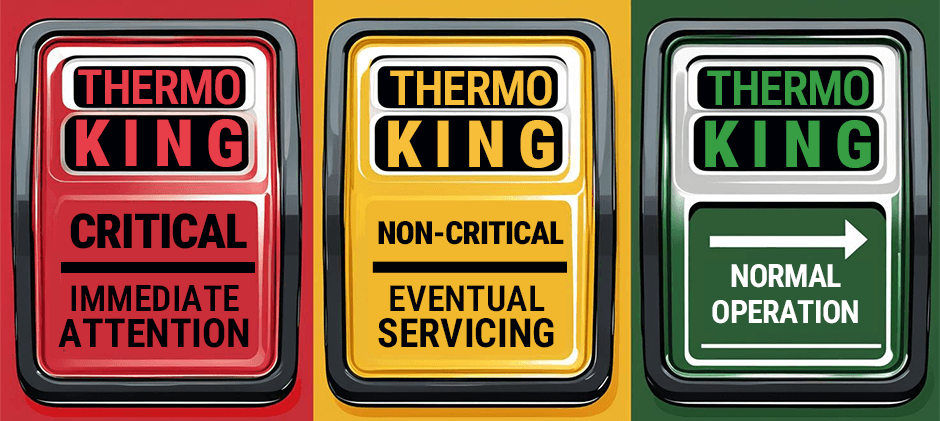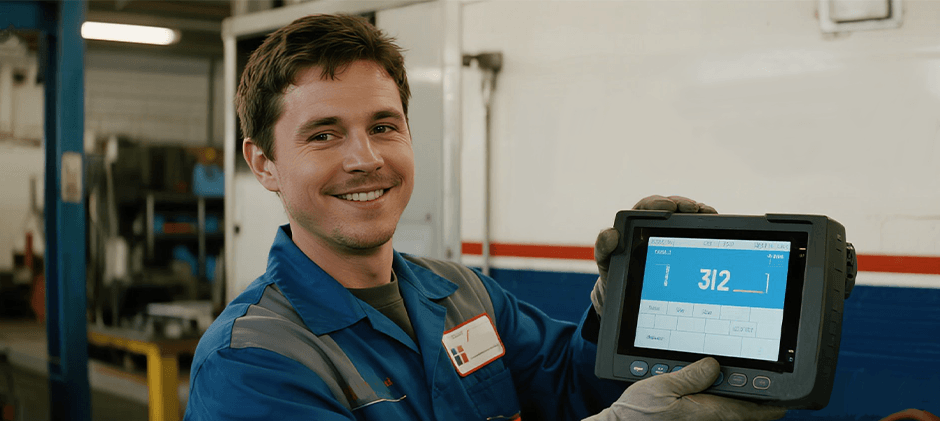The Thermo King codes are essential for quickly diagnosing and resolving issues. Knowing these codes helps you identify problems efficiently, turning potential breakdowns into manageable repairs. In this guide, we will explain what these codes are, why they matter, and how to recognize them so you can be aware of the most common alerts and critical warnings. Let’s start to make you a confident troubleshooter.
What are the Thermo King Codes
Thermo King codes, often referred to as “alarm codes” or “fault codes,” are part of the diagnostic system designed for Thermo King transport refrigeration units. These codes are displayed on the unit’s controller to help operators and service technicians quickly identify the operational status or potential malfunctions. Each code represents a specific event or issue. The code system often categorizes alarms by severity, for example:
- Red Status: Indicates a critical fault that could lead to a unit shutdown or cargo damage, requiring immediate action.
- Yellow Status: Indicates a non-critical issue that needs attention. It is often recommended to report and have it checked at the end of the day.
- Green Status: Typically indicates normal operation or a reminder.

How to Identify These Thermo King Codes
Spotting a code on your Thermo King unit is just the start—knowing what it means is key to fixing the problem fast. Whether it’s a general warning, a specific component failure, or an issue with your main reefer unit versus your APU, knowing the difference helps you narrow down the problem quickly. Below, we will introduce the most common categories of Thermo King codes. So you can confidently identify what your equipment is telling you.
Thermo King Alarm Codes
This is the most general and widely used term, serving as the primary way the machine tells its status, warnings, or malfunctions to the operator. Here are some of the most common codes we will meet in our repair and parts supply work:
- Code 00: No Alarms Exist: This is great news! It means your unit is currently operating normally with no recorded faults.
- Code 03: Check Control Return Air Sensor: The control system has detected an abnormal reading or signal loss from the return air temperature sensor. This can affect the unit’s temperature control accuracy.
- Code 10: High Discharge Pressure: The compressor’s discharge pressure or temperature has exceeded the safety limit. This can lead to system overload and potential damage.
- Code 19: Low Engine Oil Pressure: This is a critical alarm indicating a risk to the engine’s lubrication system. It requires immediate attention to prevent engine damage.
- Code 37: Engine Coolant Level: The coolant level in the engine’s cooling system is low, which can lead to engine overheating.
- Code 63: Engine Stopped – Reason Unknown: The unit’s controller commanded the engine to run, but it detected an unexpected shutdown.
Thermo King Fault Codes
This term is often used interchangeably with “Alarm Codes,” but it can be more specific. A “Fault Code” typically indicates a definitive malfunction diagnosed by the system in a specific component or circuit, rather than just a general condition. It answers “what is broken?” Here are some examples that emphasize this specificity:
- Code 03: Check Control Return Air Sensor: This indicates a fault with the return air sensor, which may be open, shorted, or providing erratic readings.
- Code 04: Check Control Discharge Air Sensor: Similar to Code 03, this pinpoints a fault with the discharge air sensor, which is important for regulating the temperature of the air entering the cargo area.
- Code 20: Check Engine Coolant Temperature Sensor: The system has identified a fault specifically with the sensor that reads the engine’s coolant temperature, not just that the engine is hot.
- Code 29: Check Damper Motor Circuit: This signifies a fault in the electrical circuit for the damper door, which controls airflow. The motor or its wiring is likely the issue.
- Code 32: Refrigeration System Fault: While broader, this fault code indicates the controller has detected a sequence of events confirming a significant problem within the refrigeration system, requiring a technician’s diagnosis.
Thermo King Apu Codes
This term is specific to the Auxiliary Power Unit (APU), like the Thermo King TriPac series. An APU’s job is to provide cab climate control and power without idling the main truck engine. Therefore, its codes focus on its small engine, A/C system, and electrical generation, separate from the cargo reefer. Here are some common APU codes:
- Code 64: Pre-trip Abort: The APU initiated its automatic pre-trip self-test but was unable to complete it successfully, pointing to a possible underlying issue that requires further investigation.
- Code 84: Service A/C Compressor Clutch Circuit: A fault has been identified in the electrical circuit that activates the APU’s air conditioning compressor.
- Code 91: Check Battery: The APU has detected that the truck’s battery voltage is too low, which could prevent startup or indicate a charging system issue.
- Code 129: Service Heater Water Pump: A problem appears with the water pump that circulates coolant to the cab heater core.
- Code 203: Check Standby Motor Overload: If the APU has an electric standby feature, this code indicates the electric motor is overloaded.
View our Thermo King APU parts catalog for back work.
Thermo King Reefer Codes
This term refers to codes specific to the main transport refrigeration unit on a trailer, truck body, or container. These codes cover all critical functions related to cooling cargo, from the diesel engine’s performance to the intricacies of the refrigeration cycle. Here are some of the most common reefer codes in our repair and parts supply work:
- Code 10: High Discharge Pressure: The compressor’s discharge pressure has exceeded the safety limit, often due to a dirty condenser or fan issue. This can lead to system overload and shutdown.
- Code 17: Engine Failed to Crank: The starter was engaged, but the engine did not turn over. This indicates a potential issue with the starter motor, battery, or electrical connections.
- Code 35: Check Refrigeration Circuit: This signifies a possible issue within the sealed cooling system, such as low refrigerant levels or a blockage.
- Code 38: Electric Overload: The unit’s electric motor has drawn too much current, tripping its protection circuit. This often occurs when the unit is running on electric standby power.
- Code 44: Low Battery Voltage: Your battery voltage dropped below safe operating levels. This can affect starting and overall unit performance. Check battery condition and charging system
- Code 52: Check Heat Circuit: A problem has been detected in the heating or defrost system. It is essential for maintaining temperature in cold conditions and for performing defrost cycles.
Check out compatible Thermo King Reefer parts now!

Why are the Thermo King Codes Important
Thermo King codes aren’t just random alerts—they’re your direct line to faster fixes, less downtime, and smarter decisions. Here’s why they matter:
1. Real-Time Visibility
A code instantly tells you what’s wrong, where, and how urgent it is—whether it’s low coolant in Unit 113 or a sensor failure 500 miles away. This turns fleet management from reactive panic into proactive control.
2. Driver Confidence
A flashing warning light used to mean stress. Now, codes tell drivers: “Pull over now” or “Check at next stop”. No more guessing—just clear actions to stay safe and keep loads secure.
3. Protect Your Business
Codes slash repair times by pinpointing issues fast, keeping trucks earning instead of sitting. A quick fix can save thousands in spoiled cargo, like catching a cooling failure before it ruins a perishable load.
4. Faster, Smarter Repairs
Mechanics love codes. Instead of hunting for problems, they get a clear answer. Like seeing “Code 04: Bad Air Sensor”, they know how to fix it immediately, which saves both time and money.
Knowing how useful these codes are, but can’t find quality and cheap Thermo King parts? Getting them from FridayParts is a good choice, with a wide range of aftermarket Thermo King parts and an OEM quality guarantee at a competitive price.
Conclusion
The Thermo King codes are the language of your machinery. By figuring them out, you are a proactive problem solver, which can help minimize downtime and keep your equipment running smoothly. Naturally, some of these codes will indicate some components that need replacement. Visit FridayParts.com today for high-quality Thermo King parts and get your unit back to peak performance.
